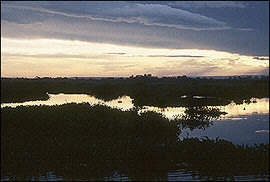 NATURAL RESOURCES: MINING, FORESTRY AND FISHING NATURAL RESOURCES: MINING, FORESTRY AND FISHING |
Agriculture is growing, but forests are decreasing. Most of the North of Kenya is a desert. Hon. Lotodo former Minister of Natural Resources claims that due to lack of international funds they cannot do much, although there is a Sector Master Plan to develop forestry for the next 25 years. This plan intends to increase the number of indigenous trees, which have been over-exploited. Thus far the area of natural forests covers an area of 1.2 million Has. Industrial plantations spread through 170,000 Has., a small area compared with the large possibilities this country offers. Its exploitation is managed by the state. It has been proposed that it should be gradually transferred to the private sector, allowing these plantations to make a profit. Forestry stands a good chance to provide employment in rural areas that have been affected by rural migration.
Another area that has thus far been overlooked by
foreign investors is mining. Today the production
of minerals contributes less than 1% to Kenya's
GDP. However there are interesting possibilities
for exploitation. The country, surrounded by mineral
rich neighbors (e.g. Tanzania), has not been able
to lure many foreign developers to this field However,
the Ministry of Natural Resources is very keen on
developing this area. Its former Minister, Hon.
Lotodo (who today jointly chairs the Ministry of
Industry with Hon. Masakhalia) specifies that they
have potential for alluvial gold, diamonds, rubies,
and other gemstones. Industrial minerals such as
soda ash or gypsum (used for the production of cement)
have been successfully been mined here. Actually,
Kenya is a large producer of limestone and soda-ash.
The Canadian Company Tiomin and Anglo-American Prospective
Services of South Africa have been extracting minerals
in Kenya for a number of years. |

Fishing is another area with potential growth. Kenya has a vast sea line comprising fisheries and fishing areas both by the Indian Ocean and in its inner lakes, including Lake Victoria. The sector has undergone serious problems, particularly affecting sweet water fishing. Lake Victoria is already quite polluted has been hit by the unchecked growth of water hyacinths. The World Bank has provided funds to clean up this menace, but only up to 1.500 Ha, instead of the 6,000 Ha needed. The introduction of more economically sound species of fish has drastically reduced the local ones, impoverishing ecosystem of the lakes. Illegal fishing practices such as the use of chemicals, pesticides and even TNT, has further deteriorated the waters in Lake Victoria. The European Union has banned all fresh water imports duet to their unethical fishing methods and the high chemical content in some of the fish. |

